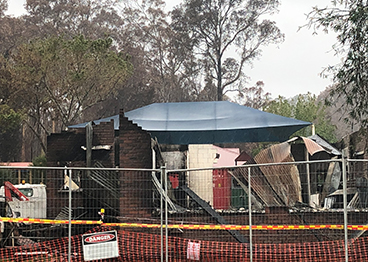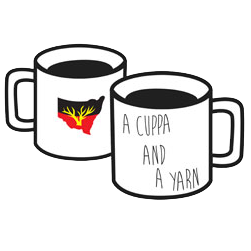
12 June, 2020
June 12, 2020
“The Roughest Journey of My Life” – Mogo’s Long Road to Bushfire Recovery Continues
“I’ll never forget the day I looked out over the ocean and it was completely jet black. I rubbed my eyes because I couldn’t believe what I was seeing. The ocean, as far as I could see, was black with embers. And this was six weeks after the fires.”
That’s Linda Carlson, CEO of the Mogo Local Aboriginal Land Council on World Environment Day 2020, remembering the bushfires that devastated her NSW south coast community in January.
2020 has been an extraordinary year, which began with raging bushfires across Australia followed by floods, the COVID-19 pandemic, and mass protests following the death in custody of George Floyd in the United States.
With isolation, deaths, food insecurity and illness hitting billions of people, the plight of the communities still suffering from the January bushfires has been pushed to the background.
Mogo shares terrifying memories and current despair with hundreds of other Australian communities.
They, like all communities, were launched into Coronavirus lockdowns with very little time to begin what was always going to be a very difficult road to recovery.
Around 300 people live in Mogo and the surrounding area. The Mogo Local Aboriginal Land Council (LALC) has a vital role for the local Yuin community in the town itself and across Broulee, Mossy Point, Batehaven, Malua Bay and Tomakin.
It provided community meeting space, a wide range of services and housing. Until the fires descended. Mogo LALC’s office was one of many annihilated by the blaze, and hundreds of people in that small part of the world were left homeless.
Linda Carlson is very clear, that the physical and mental health of her community continues to decline.
“I feel that Australia has forgotten about us, not only in Mogo but in all the areas devastated by these fires. This has been the roughest journey of my life, and every day I’m reminded of how far we have to go.
As the CEO of the LALC I must remain strong and focused, but I’m only human, and it tears my heart to pieces when community members come to see me in tears every day. Everyone is traumatised and going into lockdown for the COVID-19 pandemic has only increased our issues.
People seem to think that after the first clean-up we went back to normal, but they’re wrong. People are still homeless. My office is now a demountable that I’ve been trying to make “normal”. Disaster recovery centres closed when the Coronavirus hit. We had no access to food or essentials. People have been trying to access mental health services but that’s difficult too. How can someone on the phone really help another person suffering nightmares and flashbacks, asthma attacks and hyperventilation?
I am extremely concerned about what the fires have done to our environment and how that’s already affecting our health. We’ve been inhaling dangerous levels of smoke since November last year. Mogo sits in a hollow, so the smoke settled on top of us for weeks and weeks. Then it blew over to Canberra, back to us, north, and back to us. We’re still breathing in chemicals and pathogens on a daily basis and have documented increases in asthma attacks, strokes, heart attacks and attempted suicides.
We can hear some birds in the forests now, but not many. The bush is still very quiet. I’ve only managed to see a small flock of just ten white cockatoos, a handful of ducks and some galahs, and I’m a person who searches for them. In the burnt-out parts of Mogo there are still no birds at all. And our other pollinators, the flying bats and bees are silent. Bees are vital to biodiversity. It breaks my heart. I don’t know how we’ll recover without them. Our beautiful country is now a ghostly hollow of burnt trees and billions of our native animals have perished, which is total mismanagement of our sacred country by all governments both past and present.
As far as I’m concerned, these fires never should have happened. Governments have failed to recognise the value of traditional cultural burns and haven’t respected us enough to allow us to work on our own land. My rangers have been trained by cultural bushfire management expert Victor Steffensen. Traditional practice prevents the sort of devastation we’ve suffered. But we need practical and financial support from governments. Where was their action plan for communities in event of a disaster? Are they going to listen and act, or will they wait till the next disaster is upon us?”

